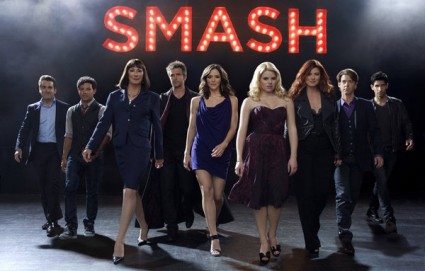
Last week, you remarked that Smash is turning out to be less a show about making a musical, and more a show about the people who make musicals. Having seen this week’s episode, I now share that opinion. One problem: I’m not sure I like these people enough to want to watch a show about their messed-up, often melodramatic personal lives.
For example, the bulk of this episode consisted of Ivy and Karen fighting like high school girls. Ivy, now affirmed as the star, or “the popular kid,” whined incessantly about Karen, getting her kicked out of two musical numbers. Karen whined about Ivy’s treatment of her until three fellow members of the ensemble took pity on her and gave her an “intervention.”
All this drama only served to paint both ladies in an unflattering light. Ivy became stereotypically self-centered, and as for Karen … the idea that she needed to be taught how to be part of the ensemble seemed to come out of nowhere. I didn’t see anything in the past three episodes that showed me she’d be the type to try and upstage Ivy. That idea seemed intended to serve as some sort of justification for Ivy’s poor attitude, and it didn’t work.
Meanwhile, Ivy got tetchy when she saw Derek flirting with Ellis’s friend at a party, and so she made a pass at TV star Lyle West (Nick Jonas, who was actually pretty good). I knew something was off when I was aware that I was supposed to be concerned about this wrinkle, but I wasn’t. You can’t expect me to be worried when the resulting fight lasted all of two minutes before Ivy propositioned Derek again. Some real tension in their relationship would have been interesting, but file that under “missed opportunity.”
Then we had Tom on a date with some guy his mother had set him up with, Eileen angsting over a lack of money caused by her scheming ex-husband Jerry, and … Dev. Dev still isn’t really doing anything, which is perhaps the biggest injustice of the show, because Raza Jaffrey is certainly a lot better than playing just “the boyfriend.”
As a result of all of the above, this episode was beyond frustrating. There’s a stellar cast in this show, whether it’s the reliable Debra Messing (did you hear her sing tonight?) or the vastly underrated Jack Davenport playing my favorite a-hole. On top of that, Smash is a really unique idea, with a great hook; not only do the musical numbers work, but it’s set in a world that hasn’t been covered by TV a dozen times before.
Yet with “The Cost of Art,” rather than feeling like I was part of the world, I felt like I was on the outside looking in. Again this week, we saw a new character who had heaps of backstory with almost everyone on the show. It made me feel like the one person not “in the know.” I was watching all these beautiful people with their problems and I didn’t feel like I was invested in how any of them resolved. Like the uncool kid standing in the corner at the party, as it were. That’s not a feeling I want when I’m watching TV. I want to feel like I have a reason for being there.
It’s only the fourth episode, so I’m going to give Smash the benefit of the doubt, and say that the characters and storylines are still evolving. I want to see this show succeed, not just because I like the idea and the cast, but for all the shows past, present and future with risky concepts. But I want to fall in love with these people, and with the exception of Derek, I’m waiting to be swept off my feet.
I actually liked this episode better than last week, but it looks like the show has some structural problems. The title “The High Cost of Art” suggests that the plot should be mainly about Eileen’s attempt to finance the show, with Nick Jonas as the featured guest actor. That’s all good. The period songs that I complained about, last week, seemed to work well in the cocktail party setting, and I was glad to see Jonas play a character, rather than doing a cameo as himself. The problem is that there might be some rules (contractual?) that the four leads (Messing, Huston, Hilty, and McPhee) get roughly 25% airtime each episode, and the latter two get a song each. So, we get one subplot that should be followed in depth, and three fillers, of which the Ivy-Karen rivalry gets shortchanged, and I don’t know why they made the lyricist such an important character, in the first place (though I enjoy Debra Messing, as an actor). The show still has the same potential it started with, but it needs to find its footing with some improvement in its writing.